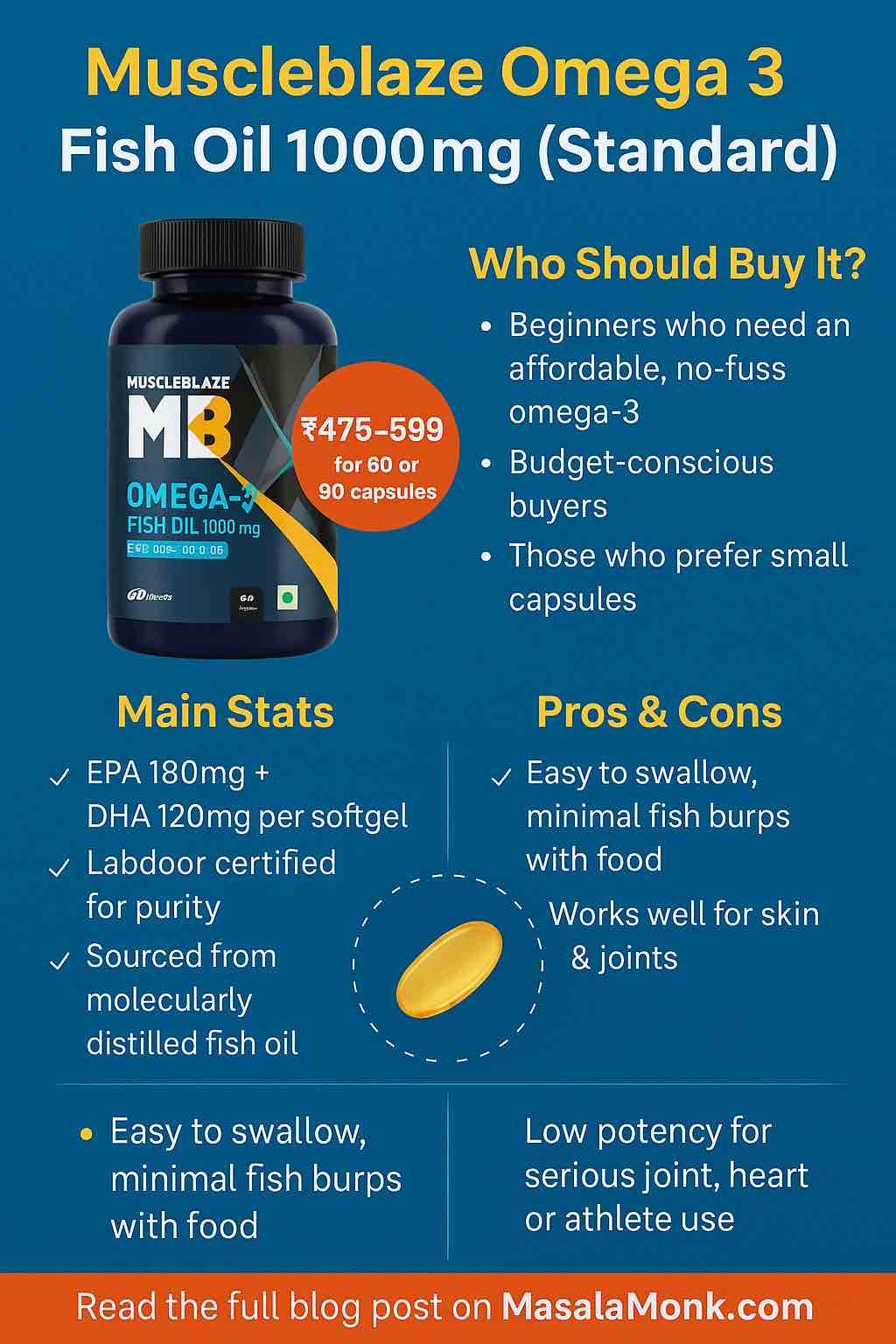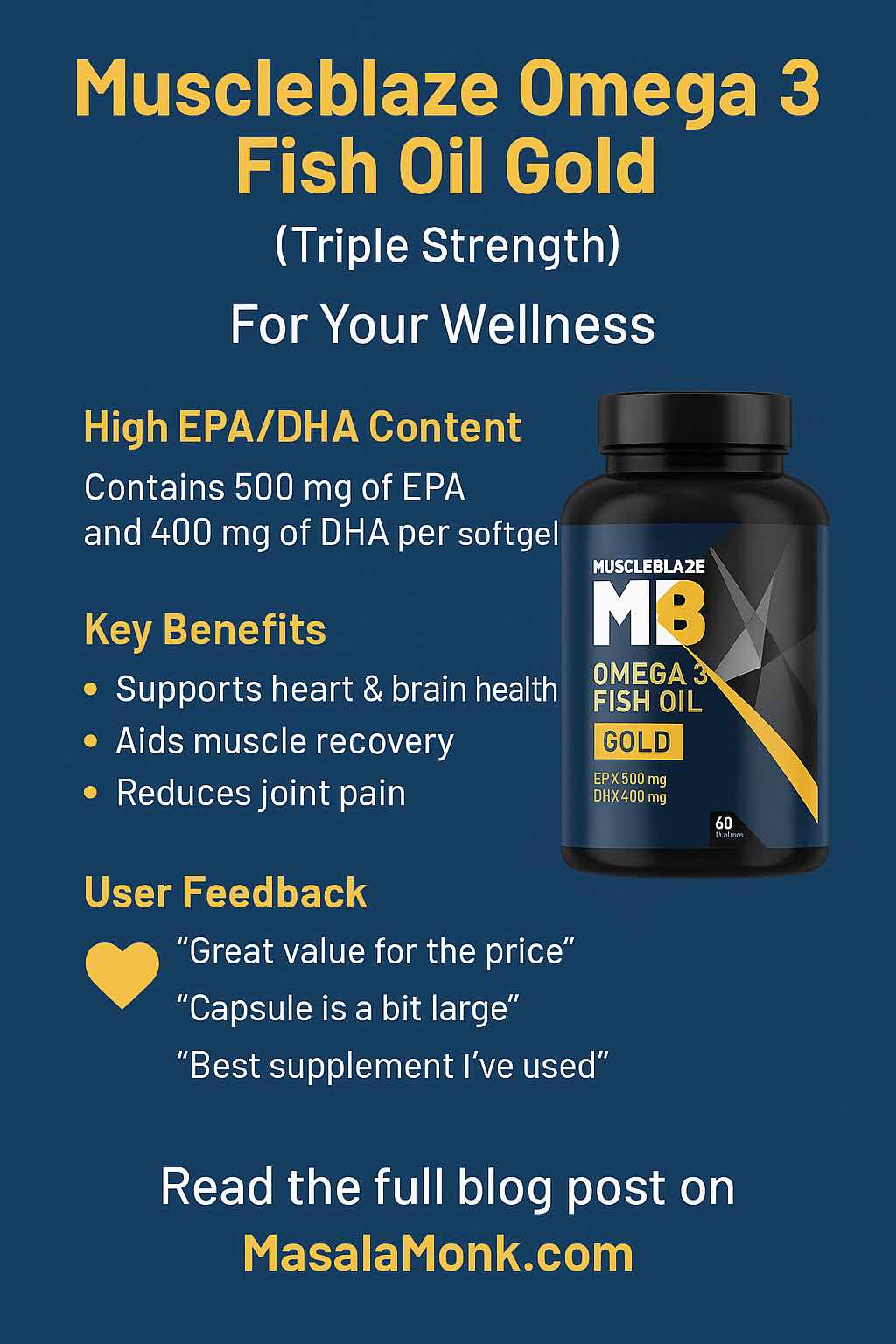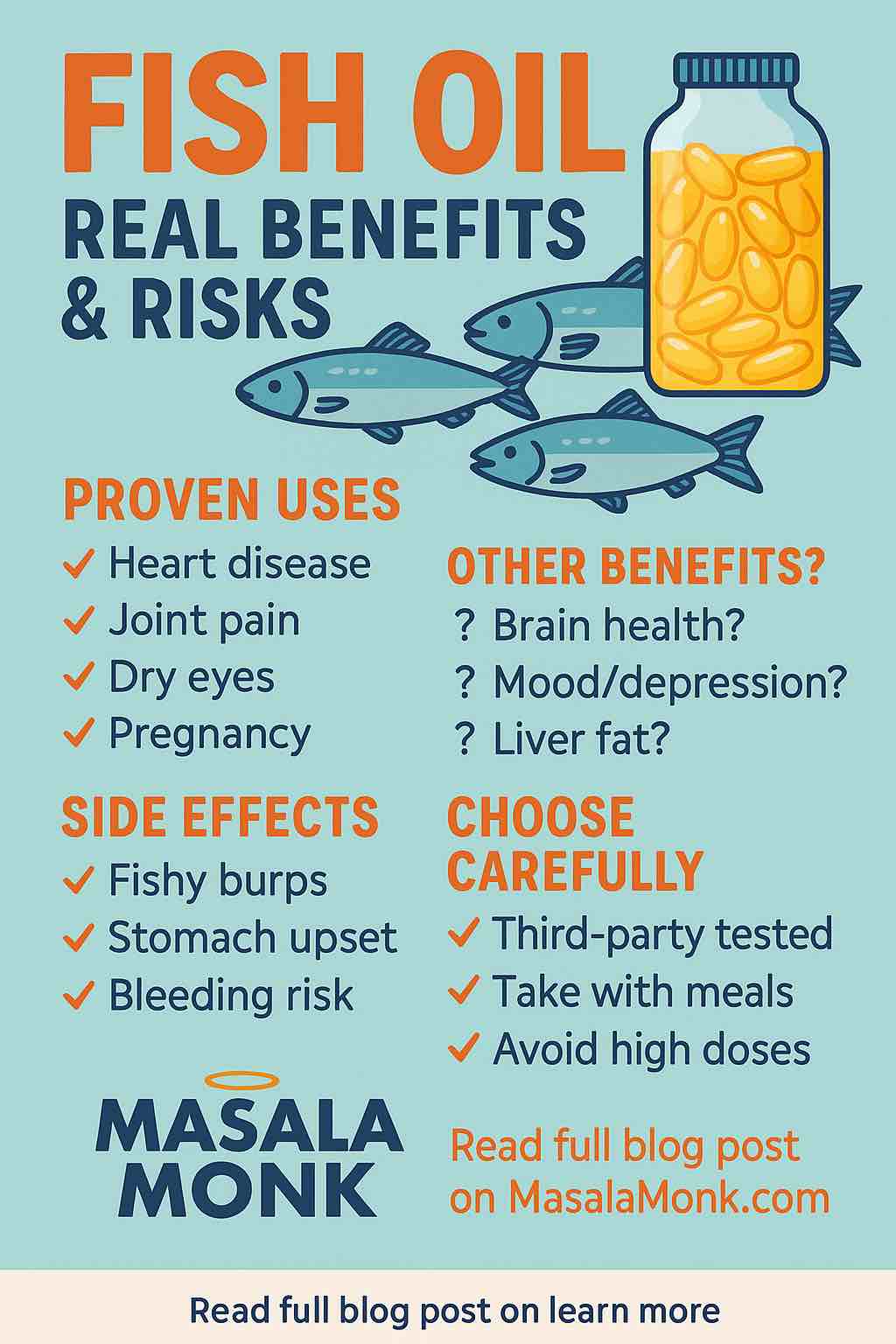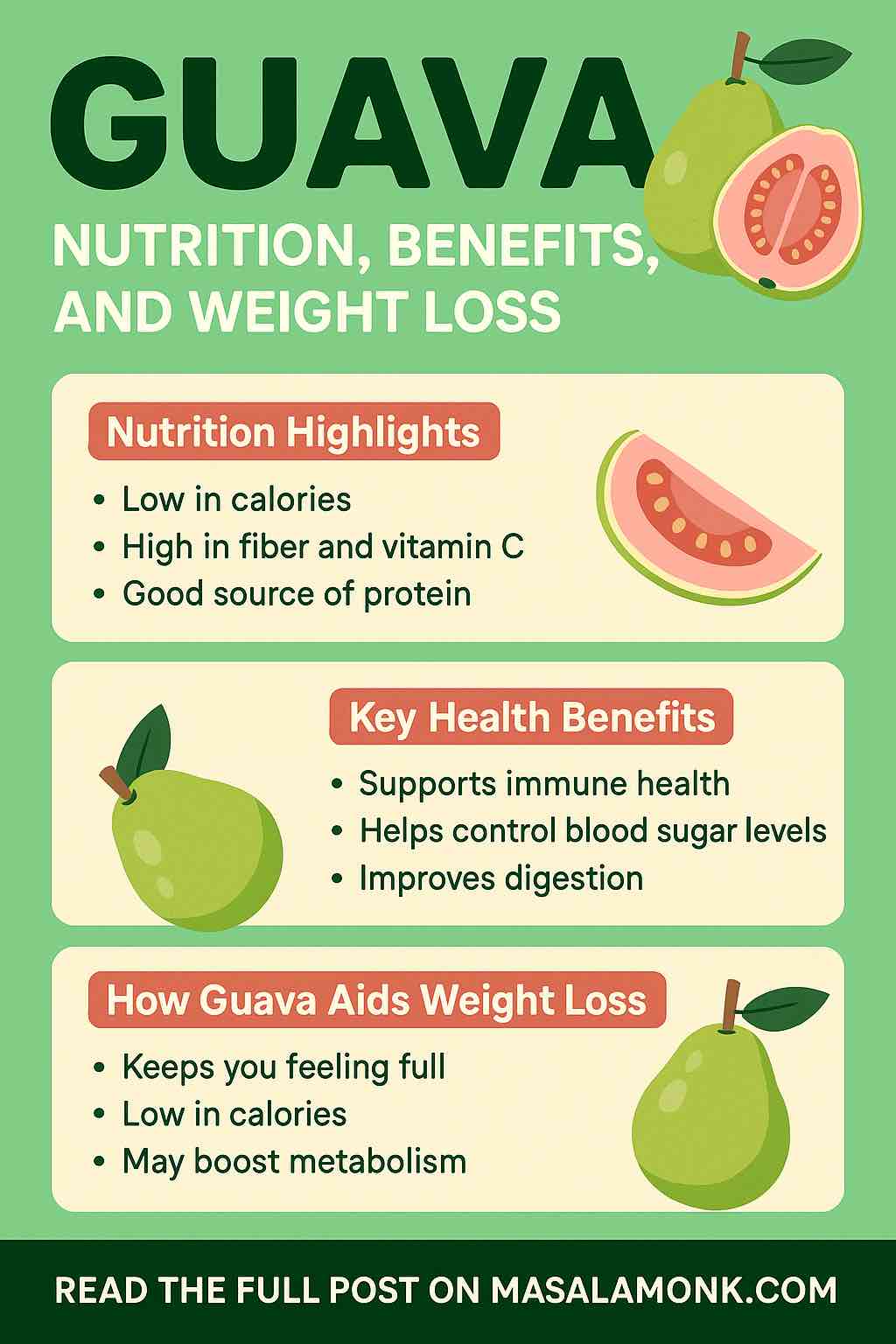
Thinking about starting fish oil?
Check our complete guide to the best fish oil supplements in India
and our ultimate science-backed benefits and safety article.
Introduction
With fitness, stress, and modern Indian diets leaving us low on essential omega-3s, high-potency fish oil supplements have become a daily staple for many. But not all “triple strength” claims are equal—so does Neuherbs Deep Sea Omega 3 live up to the hype, or is it marketing spin?
This deep-dive will reveal what’s in each capsule, how it compares to the competition, and what real users say—so you can decide if this “super dose” is right for your wellness, joints, brain, or athletic recovery.
Want to know what fish oil really does, and who needs it most?
See our ultimate fish oil benefits and science guide here.
Quick Product Snapshot
- Product: Neuherbs Deep Sea Omega 3 Fish Oil (Triple Strength)
- Each Capsule: 1,250mg fish oil (446mg EPA, 297mg DHA)
- Serving Size: 2 capsules (per serving: 892mg EPA + 594mg DHA)
- Pack Sizes: 60, 120, or 200 softgels
- Price Range: ₹699–₹1,200 depending on pack size (check latest price and reviews)
- Flavor: Lemon-coated softgel—designed to minimize fishy burps
- Added Ingredients: Vitamin D3, Vitamin E
- Form: Ethyl ester (not triglyceride), molecularly distilled
- Source: Deep-sea fish (sardine, mackerel, anchovy mix)
- Who is it for? Athletes, wellness-focused adults, anyone wanting high daily EPA+DHA
What Makes Neuherbs Deep Sea Omega 3 Unique?
1. “Triple Strength” Potency—But Read the Serving Size
Neuherbs claims 892mg EPA + 594mg DHA “per serving” (total omega-3: 1,486mg).
Important: This “per serving” dose = 2 capsules. Each individual softgel gives you 446mg EPA + 297mg DHA—still potent, but not as “ultra high” as the label might first appear.
Why this matters:
Most Indian fish oils give you just 180mg EPA + 120mg DHA per capsule. Even one Neuherbs capsule is much stronger than standard—but don’t be misled by “per serving” advertising. Always compare per capsule!
Want a true one-capsule mega dose? See MuscleBlaze Gold Triple Strength or our best omega 3 roundup.
Read our evaluation of MuscleBlaze Omega 3 Fish Oil Gold Review -Triple-Strength EPA/DHA.
2. Lemon Flavored—“Burpless” Promise
Neuherbs pioneered the “flavor-coated” fish oil in India, using a lemon flavor to help mask fishy burps and aftertaste.
Does it work?
- Most users say yes: “No fishy burps, nice smell, easy to take” is a common theme.
- A few sensitive reviewers still report mild aftertaste, especially if taken on an empty stomach.
3. Added Vitamin D3 and E
This supplement combines omega-3 with vitamin D3 (for bone/immune support) and vitamin E (antioxidant). For many Indians low in D3, this is a real plus—just check your other supplements to avoid doubling up.
4. Formulation & Bioavailability—What You Need to Know
Neuherbs uses ethyl ester (EE) form omega-3, not natural triglyceride (TG) form.
- EE is less bioavailable than TG unless taken with a high-fat meal.
- For best results, always take with food containing some fat (milk, eggs, nuts, or oil).
Advanced users and athletes sometimes prefer TG form (which is often more expensive). If you’re after max absorption, read labels or try MuscleBlaze Gold or TrueBasics Omega 3, which use different forms.
Real User Experience: Reviews & Results
⭐ What Users Love
- Noticeable health effects:
- “Great product, my cholesterol is down and joint pain improved after a month.”
- “Good for memory, concentration, and skin glow. I take two capsules with breakfast.”
- “No fishy aftertaste—lemon flavor actually works.”
- Repeat buyers:
- “Tried several fish oils, but this one gives the best value for high dose. Ordered 3rd bottle!”
- Added D3 a bonus:
- “I’m not regular with my vitamin D, so this is perfect.”
⚠️ Criticisms and Watch-Outs
- Label confusion:
- “Very misleading marketing. You have to take 2 capsules for the advertised dose.” (Amazon user review)
- Still some burps for a few:
- “Did get slight lemony fish burp if I skipped breakfast.”
- Big capsule size:
- “Capsule is large, not suitable if you have trouble swallowing pills.”
- EE form may be less absorbed:
- “Ethyl ester is less bioavailable, wish they’d use natural form.”
How It Compares: Neuherbs vs Other Top Fish Oils in India
| Product & Review Link | EPA/DHA per Cap | Price (60 caps) | Key Features | Buy Now |
|---|---|---|---|---|
| Neuherbs Deep Sea Omega 3 | 446/297 mg | ₹699–₹1200 | Lemon flavor, D3+E, high dose | Buy |
| MuscleBlaze Gold (Triple Strength) | 500/400 mg | ~₹875 | Highest single cap dose, vanilla | Buy |
| MuscleBlaze Standard | 180/120 mg | ~₹475–₹599 | Budget, small cap, starter | Buy |
| Wellbeing Nutrition Omega 3 | 612/408 mg | ~₹948 | Curcumin-infused, slow release | Buy |
| Carbamide Forte Triple Strength | ~495/330 mg | ~₹699 | Value, bestseller | Buy |
| TrueBasics Omega 3 | 525/375 mg | ~₹649 | Good absorption, moderate cap | Buy |
| Tata 1mg Omega 3 | 560/400 mg | ~₹715 | Budget, family use | Buy |
Want a deep dive on all 7 brands? Read our best omega 3 guide here.
Practical Usage Guide
- Best way to take:
- 2 capsules daily with a meal containing fat (for absorption)
- With breakfast or lunch, not empty stomach
- How long for results?
- Most report better joint comfort, skin, or focus after 3–6 weeks of consistent daily use
- Storage:
- Cool, dry place. Refrigerate only in very hot climates.
- Check for freshness:
- Capsules should not smell rancid—mild lemon scent is normal.
Who Should Use Neuherbs Deep Sea Omega 3?
Great fit for:
- Anyone seeking high daily EPA/DHA (especially if you need ~1000mg EPA)
- People sensitive to fishy burps—lemon flavor is very effective
- Adults needing combined omega-3, vitamin D3, and vitamin E in one product
May not suit:
- Those who want natural triglyceride (TG) form for highest absorption
- People who have trouble swallowing large capsules
- Anyone expecting “892mg EPA per capsule”—remember, that’s per 2 capsules
Looking for plant-based or algae omega-3s? This is NOT a vegetarian/vegan product.
Value for Money
- ₹700 for 60 capsules (30 servings) = about ₹23 per effective serving (2 capsules)
- High compared to low-dose fish oils, but matches or beats imported clinical-strength products on price per mg EPA+DHA
- With D3 and E included, good overall value for most adult users
Final Verdict: Is Neuherbs Deep Sea Omega 3 Worth It?
Yes, if you want real clinical-strength omega-3 in a “burpless” format—at a fair price and with extra vitamins for Indian wellness needs.
It’s especially strong for joint support, heart health, mood, and cognitive benefits—if you’re consistent, and take with food.
Transparency is key:
- Be aware of the per capsule vs per serving labeling.
- If you have absorption concerns or want the very highest potency in one pill, compare with MuscleBlaze Gold or TrueBasics Omega 3.
Want to check reviews, price, or order Neuherbs Deep Sea Omega 3?
👉 Buy on Amazon India (official listing)
Useful Resources & Further Reading
- Best Fish Oil Supplements on Amazon India – 7 Brands Compared
- What Is Fish Oil Good For? (Benefits, Side Effects & More)
- MuscleBlaze Gold Triple Strength
- Wellbeing Nutrition Omega 3
- Carbamide Forte Triple Strength
- TrueBasics Omega 3
- Tata 1mg Omega 3
- Fish Oil and Cortisol: Can Omega-3 Help You Manage Stress Hormones?
This review is for educational purposes only. Always consult your physician before starting a new supplement, especially if you have a health condition or take medication.
10 FAQs for Neuherbs Deep Sea Omega 3 Fish Oil (Triple Strength)
1. What is the actual EPA and DHA content per Neuherbs Deep Sea Omega 3 capsule?
Each capsule provides 446mg EPA and 297mg DHA. The higher “892mg EPA + 594mg DHA” numbers are for a serving of 2 capsules.
2. What is the recommended dosage for best results?
The suggested serving is 2 capsules per day, taken with a meal containing some fat for optimal absorption.
3. Does Neuherbs Deep Sea Omega 3 cause fishy burps or aftertaste?
Most users report no fishy burps thanks to the lemon flavor, especially when taken with food. A small number of sensitive users may still notice a mild aftertaste.
4. Is this product suitable for vegetarians or vegans?
No, it contains fish oil (from deep sea fish) and gelatin. Those seeking plant-based omega-3s should look for algae-based alternatives.
5. What is the form of omega-3 used, and why does it matter?
Neuherbs uses the ethyl ester (EE) form, which is less bioavailable than triglyceride (TG) form unless taken with dietary fat. Always take with food for best results.
6. Are there any added vitamins or nutrients?
Yes, Neuherbs includes Vitamin D3 (for bone/immune support) and Vitamin E (an antioxidant), making it a multipurpose supplement.
7. How is the product purified and is it safe?
The oil is purified via molecular distillation to remove heavy metals and toxins. It is also lab-tested for safety.
8. Can I take this with other supplements or medications?
It is generally safe with other supplements (e.g., multivitamins), but always check with your doctor, especially if you take medication or have medical conditions.
9. Is this product suitable for children or seniors?
It is designed for adults. For children or seniors, consult a healthcare professional before use.
10. How long does it take to see results?
Many users notice improved joint comfort, energy, or skin health within 3–6 weeks of consistent daily use.













